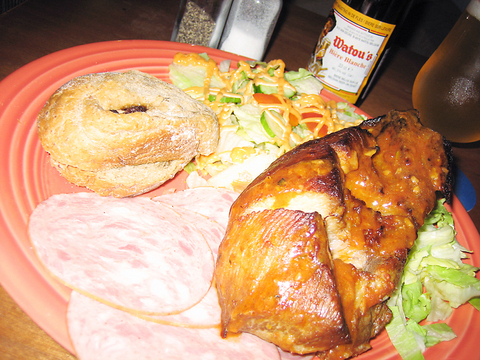Odeon means "house of song" in Greek and is thus a popular name for cultural venues and restaurants that want to give off a classy, artsy vibe. It's the name of a cinema chain in the UK, an events center in Saskatoon, Canada, a restaurant on New York's Broadway Avenue and a student district cafe in Taiwan.
Though the Cafe Odeon opus II (now known as CO2) on Xinsheng Road probably doesn't have much on the US$20 entrees at The Odeon on Broadway, it does a respectable job of creating a culture-friendly atmosphere. The theme for both the food and the decor is European, with an emphasis on Belgium. Picture albums on a bookshelf by the door chronicle owner Arvin Cheng's (
The cafe's location in an alley across from National Taiwan University works well to heighten the sense of artsy academia CO2 strives for. Written in chalk on a blackboard sign by the door is an explanation of how Cheng chose the name Odeon: "Odeon is the name of a stop on the Paris subway in an area where the arts and humanities flourish ... we hope that Odeon can provide a similar cultural space."

PHOTO: MEREDITH DODGE , TAIPEI TIMES
But CO2 is better known for providing a wide selection of Belgian beer, and that is not a bad thing. From the light to the dark to the positively fruity, CO2's beer fridge has what you're looking for. After walking around in the hot sun I decided to order a Watou's witbier (Flemish for "white beer") -- refreshing with a hint of jasmine.
The meal I ordered to go with it, a stack of pork ribs with beer wurst, wasn't exactly refreshing, but it certainly was replenishing. The salad was an unnecessarily large pile of lettuce and a few tomatoes criss-crossed with thousand-island dressing -- I only ate about a quarter of it. That's because I was thoroughly engaged with the hunk of meat sitting next to it.
The rib meat was tender and juicy and accompanied with an appropriate layer of tasty fat. Though the steak knife they gave me cut the meat easily off the bone, I worked up a sweat eating the ribs. Luckily I had saved some witbier to quench my thirst. I say luckily because the lame salad and the bone-dry raisin toast (they could have at least given me some butter) did nothing to counteract the ultra-heavy meatiness of the ribs. Overally, however, CO2 is a great place for a beer and a chat
with friends. Food is served till late.

Taiwan has next to no political engagement in Myanmar, either with the ruling military junta nor the dozens of armed groups who’ve in the last five years taken over around two-thirds of the nation’s territory in a sprawling, patchwork civil war. But early last month, the leader of one relatively minor Burmese revolutionary faction, General Nerdah Bomya, who is also an alleged war criminal, made a low key visit to Taipei, where he met with a member of President William Lai’s (賴清德) staff, a retired Taiwanese military official and several academics. “I feel like Taiwan is a good example of

March 2 to March 8 Gunfire rang out along the shore of the frontline island of Lieyu (烈嶼) on a foggy afternoon on March 7, 1987. By the time it was over, about 20 unarmed Vietnamese refugees — men, women, elderly and children — were dead. They were hastily buried, followed by decades of silence. Months later, opposition politicians and journalists tried to uncover what had happened, but conflicting accounts only deepened the confusion. One version suggested that government troops had mistakenly killed their own operatives attempting to return home from Vietnam. The military maintained that the

Before the last section of the round-the-island railway was electrified, one old blue train still chugged back and forth between Pingtung County’s Fangliao (枋寮) and Taitung (台東) stations once a day. It was so slow, was so hot (it had no air conditioning) and covered such a short distance, that the low fare still failed to attract many riders. This relic of the past was finally retired when the South Link Line was fully electrified on Dec. 23, 2020. A wave of nostalgia surrounded the termination of the Ordinary Train service, as these train carriages had been in use for decades

Lori Sepich smoked for years and sometimes skipped taking her blood pressure medicine. But she never thought she’d have a heart attack. The possibility “just wasn’t registering with me,” said the 64-year-old from Memphis, Tennessee, who suffered two of them 13 years apart. She’s far from alone. More than 60 million women in the US live with cardiovascular disease, which includes heart disease as well as stroke, heart failure and atrial fibrillation. And despite the myth that heart attacks mostly strike men, women are vulnerable too. Overall in the US, 1 in 5 women dies of cardiovascular disease each year, 37,000 of them